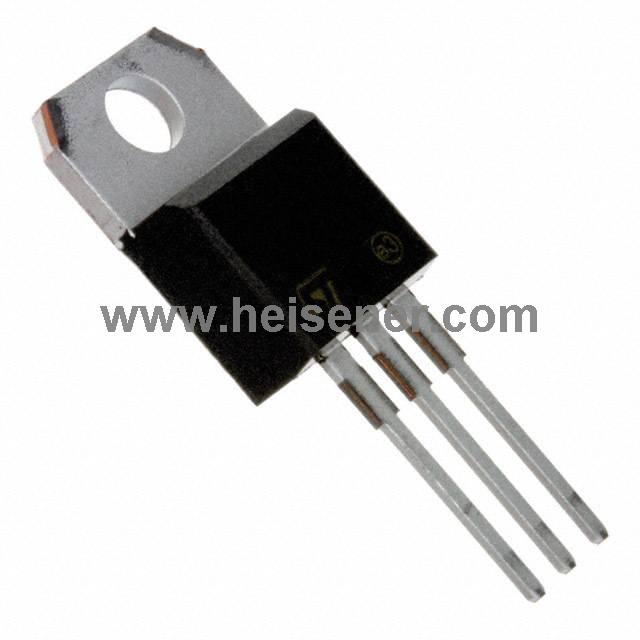
BDW93C Basics
The BDW93C is a silicon epitaxial-base NPN power transistor configured in a monolithic Darlington arrangement, housed in a JEDEC TO-220 plastic package. This transistor is designed for power linear and switching applications, offering excellent current amplification characteristics suitable for high-power circuit requirements. Additionally, its complementary PNP transistor is the BDW94C, with the BDW94B also available as a PNP option, providing designers with various choices to meet different circuit needs.
BDW93C Pinout

The BDW93C typically has a TO-220 package with the following pinout:
Collector (C): The collector pin is used to connect the power supply or load.
Base (B): The base pin is used for controlling the transistor and is connected to the input signal.
Emitter (E): The emitter pin is connected to the ground or the negative side of the circuit.
BDW93C Internal Schematic Diagram

BDW93C Symbol

BDW93C Footprint

BDW93C 3D Model

BDW93C Specification
| Specification | Value |
| Type | NPN |
| Configuration | Monolithic Darlington |
| Package | TO-220 |
| Voltage - Collector Emitter Breakdown (Max) | 100 V |
| Current - Collector (Ic) (Max) | 12 A |
| Vce Saturation (Max) @ Ib, Ic | 3V @ 100mA, 10A |
| Power - Max | 80 W |
| Current Gain (hFE) | 1000 (min) at Ic = 3 A |
| Current - Collector Cutoff (Max) | 1mA |
| DC Current Gain (hFE) (Min) @ Ic, Vce | 750 @ 5A, 3V |
| Operating Junction Temperature (Tj) | 150 °C |
| Storage Temperature Range (Tstg) | -55 ~150 °C |
BDW93C Features
STMicroelectronics PREFERRED Preferred Salestypes
Complementary PNP - NPN Devices
Integrated Antiparallel
Collector-Emitter Diode
High Current Gain
Darlington Configuration
Robust Power Handling
Low Saturation Voltage
BDW93C Applications
Power Darlington TR
Complement to BDW94, BDW94A, BDW94B and BDW94C respectively
Linear and Switching Industrial Equipment
Motor Control
Audio Power Amplifiers
Switching Power Supplies
Linear Regulators
Relay Drivers
Battery Chargers
BDW93C Package
The BDW93C is packaged in a JEDEC TO-220 plastic package, which is widely used in the electronics industry and is particularly suitable for power transistors.The TO-220 package is designed with an emphasis on thermal performance and is equipped with a large heat sink. The package's external dimensions are usually 10.16mm x 15.24mm x 4.57mm, thickness of 4.6mm, suitable for soldering and mounting on the circuit board. The pin spacing is typically 2.54mm for easy connection to other components, and the TO-220 package has a rugged plastic case that provides good physical protection.

How to Use BDW93C?
When using the BDW93C, start by connecting it correctly according to its pinout. The collector (C) is usually connected to the load, the emitter (E) to ground or the negative terminal, and the base (B) to the control signal through a suitable resistor. Make sure the connections are secure to avoid poor contact.
After the wiring is done, check the power supply voltage and current to ensure they are within the safe operating range of the BDW93C. Power on the circuit and monitor the transistor's behavior. If you notice any overheating or unusual behavior, turn off the power immediately to prevent damage.
Finally, adjust the base control signal according to your needs. For example, when driving a motor, you can control the motor’s start, stop, or speed by varying the base current. By following these steps, the BDW93C can effectively function in your circuit.
FAQs
What is the BDW93C?
The BDW93C is a silicon epitaxial-base NPN power transistor configured in a monolithic Darlington arrangement, designed for linear power and switching applications.
How do I connect the BDW93C?
Connect the collector (C) to the load, the emitter (E) to ground or the negative terminal, and the base (B) to a control signal through a resistor. Always refer to the pinout diagram for accurate connections.
What are the key features of the BDW93C?
The BDW93C offers high current gain, suitable for driving high-power loads, low saturation voltage, and is housed in a TO-220 plastic package, which helps in efficient heat dissipation.